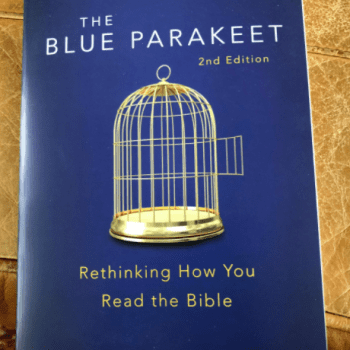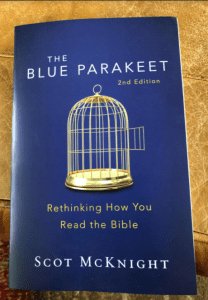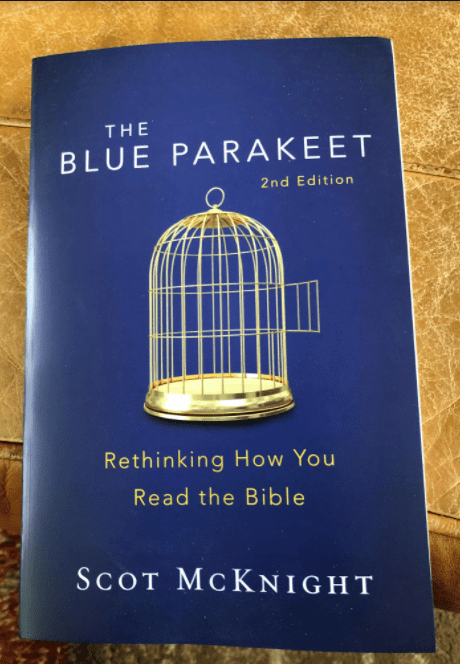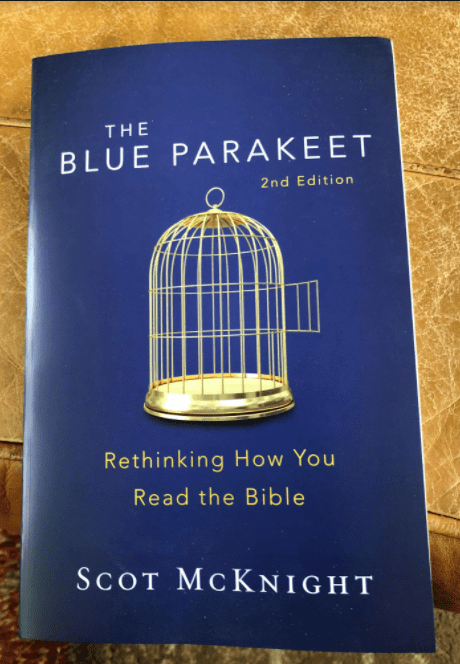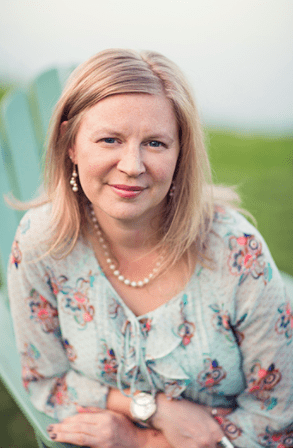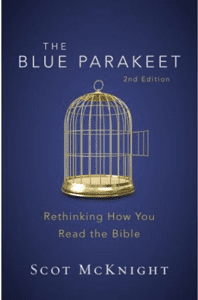 The second edition of Scot’s book The Blue Parakeet is now available. The book is one of his best, a book that helps the reader think through the nature of the Bible as inspired and authoritative. From the back cover: “The second edition also includes new sections on race and slavery, the atonement, Genesis and science, and kingdom and justice issues.” While the first edition is outstanding, it did have some shortcomings. The most significant was the application of reading the Bible as story to only one issue – Women in Church Ministries Today. While this is a significant issue, and one that needs attention, it is far from the only issue raised by some approaches to Scripture. The revised version of The Blue Parakeet corrects this shortcoming by inserting a new section – Part 4 – with chapters Slaves/Atonement/Justice in the King and his Kingdom Redemption Story. Women in Church Ministries becomes Part 5. In addition there is an new appendix on Genesis and Science. This appendix is the subject of today’s post.
The second edition of Scot’s book The Blue Parakeet is now available. The book is one of his best, a book that helps the reader think through the nature of the Bible as inspired and authoritative. From the back cover: “The second edition also includes new sections on race and slavery, the atonement, Genesis and science, and kingdom and justice issues.” While the first edition is outstanding, it did have some shortcomings. The most significant was the application of reading the Bible as story to only one issue – Women in Church Ministries Today. While this is a significant issue, and one that needs attention, it is far from the only issue raised by some approaches to Scripture. The revised version of The Blue Parakeet corrects this shortcoming by inserting a new section – Part 4 – with chapters Slaves/Atonement/Justice in the King and his Kingdom Redemption Story. Women in Church Ministries becomes Part 5. In addition there is an new appendix on Genesis and Science. This appendix is the subject of today’s post.
In some ways the appendix on Genesis and Science is a brief summary of Scot’s chapters in Adam and the Genome, but it makes an excellent addition to The Blue Parakeet. Many concerns that Christians have about evolution have nothing at all to do with scientific questions or evidence. The concerns are biblical and theological. The evidence for a long history and common descent appear to contradict the Bible and challenge our understanding of human vocation, human nature and original sin. Some will go so far as to claim that without a traditional understanding of original sin (i.e. Adam’s Fall in the garden) atonement is unnecessary and meaningless. No Adam, no need for a savior.
Scot outlines what he calls the “historical Adam” view (p. 314): Two actual persons existed suddenly as the result of God’s creation. They have a biological and genetic relationship to all humans alive today. Adam and Eve sinned, died, and brought death into the world and passed on their newly acquired sin natures to all their descendants – i.e. all humans. It is this string of connections that results in a universal need for salvation. No human being is exempt.
While this is a plausible reading of Scripture, many of the findings of modern science call into question the foundation of the scenario. There is ample evidence of evolution. Humans developed as a population. While we all share common ancestors, there is no evidence for a unique pair of individuals as the sole progenitors of the human race. The genetic evidence suggests that the population was always in the thousands.
This challenge send us back to consider what the Bible teaches again. Is the historical Adam truly foundational? Probably not. Adam and Eve do not play a central role in the Old Testament, in fact, they are absent except for genealogies after the first chapters of Genesis, nor do they play such a role in Jewish tradition. “Adam and Eve in the Jewish tradition were flexible human being, and each author used Adam and Eve in differing ways because each author saw the literary Adam and Eve as archetypal or representative humans.” (p. 316)
Paul uses Adam and Eve in ways that differ from the Jewish tradition that surrounded him, but his approach is the same. Adam is a literary archetype or representative. Paul is not making a scientific and genetic statement. The key point is the contrast between Adam and Christ (p. 317).
Adam: Sin -> Death -> Condemnation -> Union with others
Christ: Obedience -> Life -> Justification -> Union with others
Paul is clear that all die “because all sinned.” We are all individually responsible for our own death through sin. Life comes through Christ. Neither death through Adam nor life through Christ require biological or genetic descent.
What does this mean for the historical Adam as outlined above? Scot emphasizes: “no one in the Bible or in the Jewish tradition taught this historical Adam theory as the church tradition teaches it.” (p. 317) The church tradition builds on Paul’s writing – but it is not simply a recap of his teaching. It elaborates his teaching. We can discard the elaboration without abandoning Paul’s teaching.
Both the Bible’s General Plot – the King and His Kingdom – and the Bible’s redemptive benefits story fit into other approaches to understanding what the Bible actually says about Adam and Eve. Jesus is King and he summons all humans into his Kingdom whether or not this historical Adam theory is accurate. But more importantly, the approach to Adam and Eve detailed above – as personally responsible for their sin and we are responsible for our sin )”because all sinned”) – is all we need for us to believe the gospel’s saving benefits: that Jesus dies for our sins and was raised for our justification (Romans 4:25) (pp. 317-318)
All this means is that no significant Christian doctrine rests on the historical Adam.
Focus on the General Plot and let the rest stand or fall on its merits.
What do you think?
If you wish to contact me directly, you may do so at rjs4mail[at]att.net
If interested you can subscribe to a full text feed of my posts at Musings on Science and Theology.

